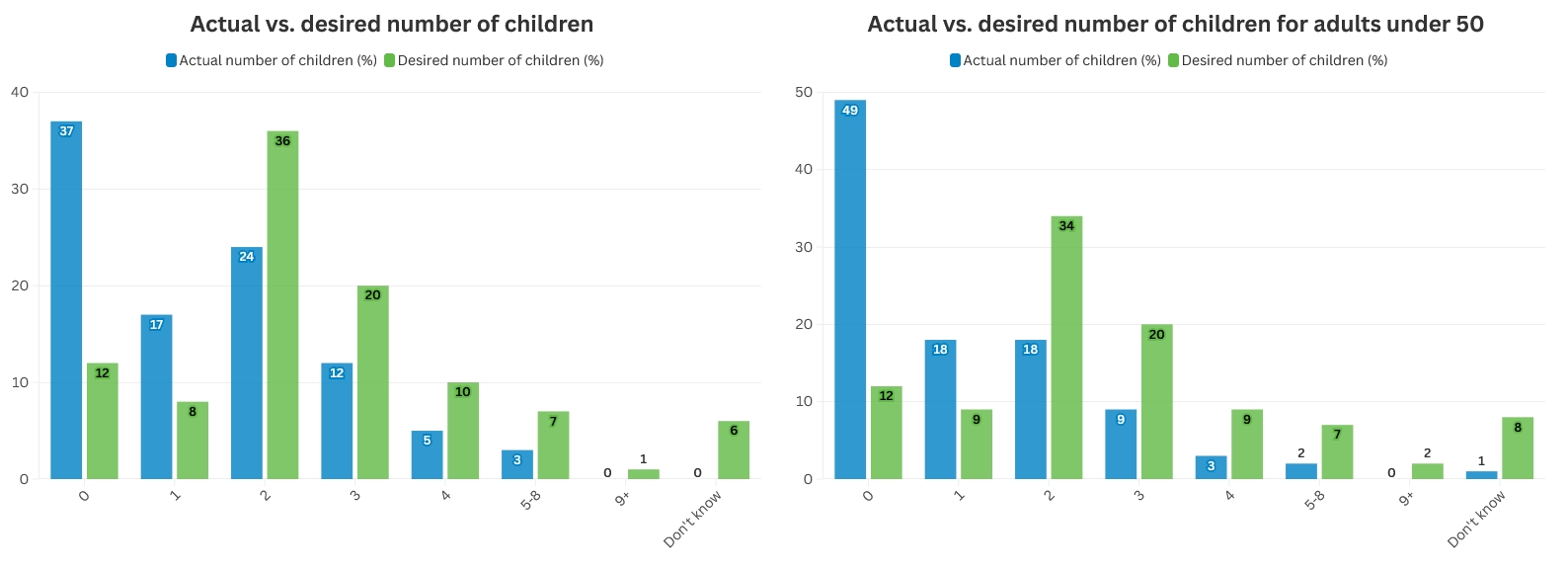Population Connection survey: Americans want small families, aren’t concerned about declining birth rates
Written by Olivia Nater | Published: February 12, 2025
An extensive new survey by Population Connection reveals that Americans have an established preference for small family sizes and do not perceive low fertility rates as a problem. Our survey also sheds light on the factors that influence the childbearing decisions of younger Americans — the top impacts being concern over the state of the world and affordability.
The context
The population narrative in today’s media stories revolves predominantly around low fertility rates in high-income countries, with many outlets describing this as a problem or “crisis.” This narrative is grounded in concern that population aging and decline could negatively impact economies, and ignores the countless benefits of reduced population pressure. It also fails to acknowledge the fact that our global population is still growing, and that even many high-income countries with low birth rates are still getting more populous due to a combination of demographic momentum and immigration.
Previous studies on family size preferences in the Global North have found that people’s “ideal” family size is often higher than actual fertility rates, leading reporters to suggest that most people are having fewer kids than they would like to have.
At Population Connection, we wanted to find out whether “baby bust” worries were also prevalent among the American people, and whether there is in fact a significant gap between US adults’ desired and actual family sizes.
The research
In October 2024, on behalf of Population Connection, research firm Lake Research Partners conducted a mixed-mode online and phone survey of 1,418 US-based adults. Lake Research Partners also held a series of in-person and online focus group discussions to dig deeper into people’s thoughts around parenthood.
Respondents were asked close to 30 questions to gain insights on people’s actual and desired family sizes, and on which factors have had the biggest impacts on their family planning decisions.
The findings
Most people want a small family, but some feel unable to fulfill their desired family size.
We found that the majority (56%) of adults (and 55% of adults under 50) desire a small family of zero to two kids. Almost two-thirds (62%) of all respondents said their desired number of children has stayed about the same over time. Among parents across all ages, the biggest proportion (44%) have the same number of children as their desired number of children, while 39% have fewer than they desire.
Across all survey participants, the most common family size was zero children (37% of respondents have no children), which is significantly higher than the number of respondents who said they desire no children (12%). While this difference can be partly attributed to Gen Z and younger Millennial participants not having started childbearing yet, it also suggests that many childless people would like or would have liked to become parents but feel or felt unable to.
Mirroring previous studies’ findings, a two-child family was by far the most desired family size, with 36% of all respondents and 34% of people under 50 preferring this size. For both these groups, three and zero children were more popular desired family sizes than one child. One-child families have been shown to be unpopular by other surveys too, suggesting bias against only-children, likely due to debunked yet persistent stereotypes.

People feel limited by the state of the world and affordability.
When asked which factors had a major impact on their ability or decision to have children, the top factors for adults under 50 were concern over the state of the world (35% said this had a major impact) and not being able to afford [more] kids (34% said this had a major impact).
Focus group participants shared these concerns. A Millennial woman with a blended family of five kids said,
“Day care is costly. Education is costly. I’m saving for each one of them for their college education right now. Only two [children] instead of five would have been a lot easier. For financial reasons and just the crazy world we live in.”
These top impacts on younger people’s ability or decision to have children are followed by mental health (27%), being worried about how laws that restrict abortion and reproductive health care will affect them/their partner during pregnancy (25%), age (25%), there not being enough support for parents in our country (22%), and current work demands and schedule making it difficult (22%).
Survey participants were also asked how much they agree with a variety of statements — close to half of respondents under 50 strongly agreed that basics like food and housing cost so much that it forces people to prioritize jobs and income over having children (51% strongly agreed), and that sometimes people want to spend their time, energy, and love doing other things than raising children (49% strongly agreed).
Over a quarter (27%) of respondents under 50 strongly agreed that overpopulation and climate change make them uneasy about raising children on a planet that is already in trouble.
Reproductive rights restrictions and not wanting kids also play an important role.
For Gen Z respondents and for women under 50, close to a third (30%) said that worries about how restrictions on abortion and reproductive health care would impact them or their partner during pregnancy have had a major impact on their childbearing decisions.
 For adults under 50 who don’t plan on having kids, not wanting them was by far the most important factor (46% said this had a major impact), conveying the growing popularity of the childfree choice.
For adults under 50 who don’t plan on having kids, not wanting them was by far the most important factor (46% said this had a major impact), conveying the growing popularity of the childfree choice.
People are more concerned about population growth than low fertility rates.
A statement about how falling fertility rates are one of the biggest challenges facing our world received the lowest amount of agreement, with only 15% of total respondents strongly agreeing.
Conversely, nearly half of all respondents (45%) said they were ‘very’ to ‘somewhat’ concerned about national population growth, while half (50%) were ‘very’ to ‘somewhat’ concerned about global population growth. Only 29% and 24% said they are ‘not concerned at all’ about national and global population growth, respectively, while for both national and global growth, 22% said they are ‘a little concerned.’
The top cited reasons for concern over population growth were more kids living in poverty (36% said they are most concerned about this impact) and natural resource depletion (30% said they are most concerned about this impact).
What does this tell us?
Our survey results suggest that most Americans have a preference for small families, which needs to be acknowledged by policymakers seeking to blindly increase the birth rate for the sake of the economy.
We also found that some adults feel unable to fulfill their desired family size — policymakers’ focus should instead be on reducing the barriers that prevent people from having the number of kids they want. Concern over the state of the world and financial constraints were found to be the most important limiting factors, which is in line with what other surveys have shown. We found that mental health and reproductive rights restrictions are also perceived as a major barrier among younger generations — the latter factor being particularly relevant in light of the hostility of the new Trump-Vance administration to sexual and reproductive health and rights.
Slides summarizing key findings are available here, and banner tables for all questions and full survey results are available here.

